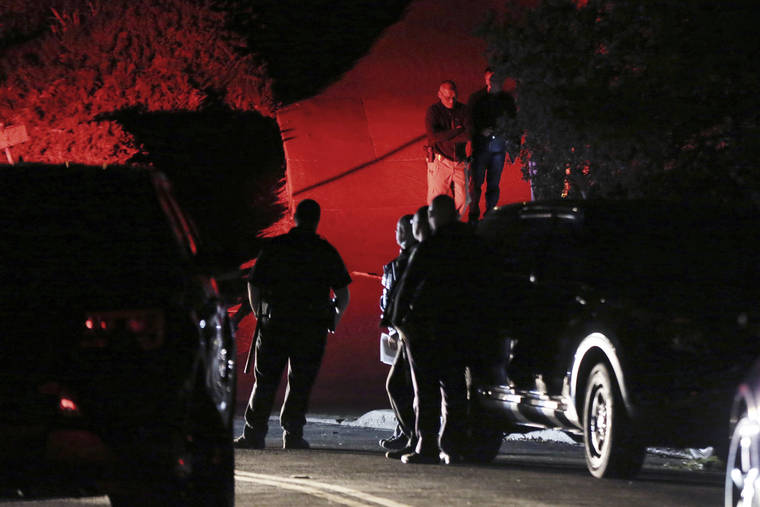AP News in Brief 11-03-19

Contra Costa County Sheriff deputies investigate a multiple shooting in Orinda, Calif., on Thursday. (Ray Chavez/East Bay Times via AP)
Airbnb bans
party houses
after California shooting kills 5
Airbnb bans ‘party houses’ after California shooting kills 5
ORINDA, Calif. — Airbnb’s CEO said the company was taking actions against unauthorized parties in the wake of a deadly shooting at a Halloween party held at an Airbnb rental home in California.
In a series of tweets, Brian Chesky said Saturday the San Francisco-based company is expanding manual screening of “high risk” reservations and will remove guests who fail to comply with policies banning parties at Airbnb rental homes.
He also said the company is forming a “rapid response team” when complaints of unauthorized parties come in.
“We must do better, and we will. This is unacceptable,” he tweeted.
Five people died after a Thursday night shooting that sent some 100 terrified partygoers running for their lives in the San Francisco suburb of Orinda.
US judge blocks Trump’s health insurance rule for immigrants
PORTLAND, Ore. — A federal judge in Portland, Oregon, on Saturday put on hold a Trump administration rule requiring immigrants prove they will have health insurance or can pay for medical care before they can get visas.
U.S. District Judge Michael Simon granted a temporary restraining order that prevents the rule from going into effect Sunday. It’s not clear when he will rule on the merits of the case.
Seven U.S. citizens and a nonprofit organization filed the federal lawsuit Wednesday contending the rule would block nearly two-thirds of all prospective legal immigrants.
The lawsuit also said the rule would greatly reduce or eliminate the number of immigrants who enter the United States with family sponsored visas.
“We’re very grateful that the court recognized the need to block the health care ban immediately,” says Justice Action Center senior litigator Esther Sung, who argued at Saturday’s hearing on behalf of the plaintiffs. “The ban would separate families and cut two-thirds of green-card-based immigration starting tonight, were the ban not stopped.”
Mueller documents: Manafort pushed Ukraine hack theory
WASHINGTON — During the 2016 presidential campaign, Trump campaign chairman Paul Manafort pushed the idea that Ukraine, not Russia, was behind the hack of the Democratic National Committee servers, Manafort’s deputy told investigators during the special counsel’s Russia probe. The unsubstantiated theory, advanced by President Donald Trump even after he took office, would later help trigger the impeachment inquiry now consuming the White House.
Notes from an FBI interview were released Saturday after lawsuits by BuzzFeed News and CNN led to public access to hundreds of pages of documents from special counsel Robert Mueller’s investigation. The documents included summaries of interviews with other figures from the Mueller probe, including Trump’s former personal lawyer, Michael Cohen.
Information related to Ukraine took on renewed interest after calls for impeachment based on efforts by the president and his administration to pressure Ukraine to investigate Democrat Joe Biden. Trump, when speaking with Ukraine’s new president in July, asked about the DNC servers in the same phone call in which he pushed for an investigation into Biden.
Manafort speculated about Ukraine’s responsibility as the campaign sought to capitalize on DNC email disclosures and as Trump associates discussed how they could get hold of the material themselves, deputy campaign chairman Rick Gates told investigators, according to a summary of one of his interviews.
From wire sources
Gates said Manafort’s assertion that Ukraine might have done it echoed the position of Konstantin Kilimnik, a Manafort business associate who had also speculated that the hack could have been carried out by Russian operatives in Ukraine. U.S. authorities have assessed that Kilimnik, who was also charged in Mueller’s investigation, has ties to Russian intelligence. American intelligence agencies have determined that Russia was behind the hack, and Mueller’s team indicted 12 Russian agents in connection with the intrusion.
Iran student leader says he regrets 1979 US Embassy attack
TEHRAN, Iran — His revolutionary fervor diminished by the years that have also turned his dark brown hair white, one of the Iranian student leaders of the 1979 U.S. Embassy takeover says he now regrets the seizure of the diplomatic compound and the 444-day hostage crisis that followed.
Speaking to The Associated Press ahead of Monday’s 40th anniversary of the attack, Ebrahim Asgharzadeh acknowledged that the repercussions of the crisis still reverberate as tensions remain high between the U.S. and Iran over Tehran’s collapsing nuclear deal with world powers.
Asgharzadeh cautioned others against following in his footsteps, despite the takeover becoming enshrined in hard-line mythology. He also disputed a revisionist history now being offered by supporters of Iran’s Revolutionary Guard that they directed the attack, insisting all the blame rested with the Islamist students who let the crisis spin out of control.
“Like Jesus Christ, I bear all the sins on my shoulders,” Asgharzadeh said.
At the time, what led to the 1979 takeover remained obscure to Americans who for months could only watch in horror as TV newscasts showed Iranian protests at the embassy. Popular anger against the U.S. was rooted in the 1953 CIA-engineered coup that toppled Iran’s elected prime minister and cemented the power of Shah Mohammad Reza Pahlavi.


